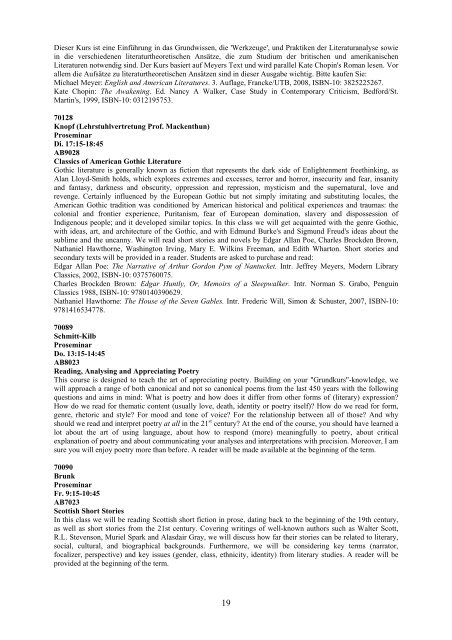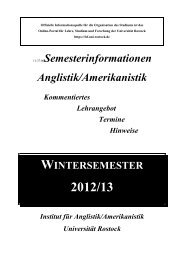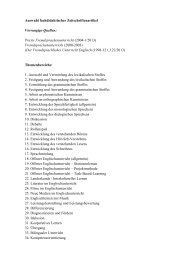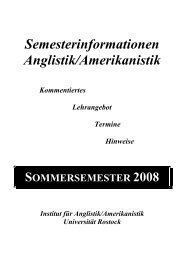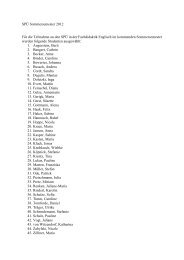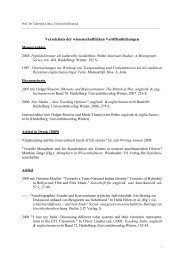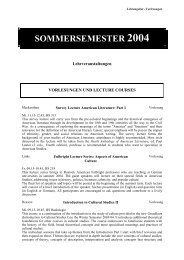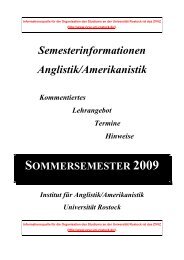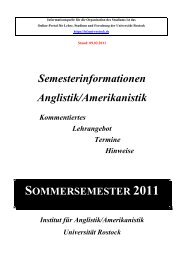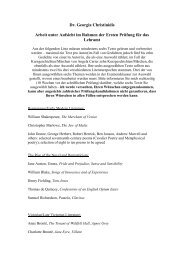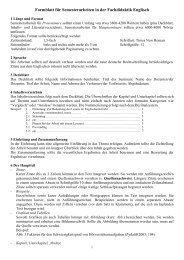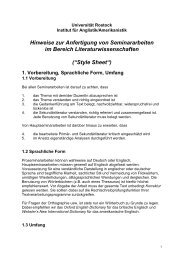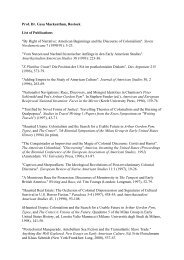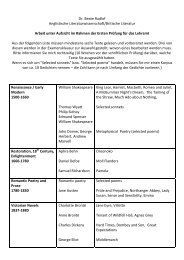Wintersemester 2011/12 - Institut für Anglistik/Amerikanistik ...
Wintersemester 2011/12 - Institut für Anglistik/Amerikanistik ...
Wintersemester 2011/12 - Institut für Anglistik/Amerikanistik ...
Sie wollen auch ein ePaper? Erhöhen Sie die Reichweite Ihrer Titel.
YUMPU macht aus Druck-PDFs automatisch weboptimierte ePaper, die Google liebt.
Dieser Kurs ist eine Einführung in das Grundwissen, die 'Werkzeuge', und Praktiken der Literaturanalyse sowie<br />
in die verschiedenen literaturtheoretischen Ansätze, die zum Studium der britischen und amerikanischen<br />
Literaturen notwendig sind. Der Kurs basiert auf Meyers Text und wird parallel Kate Chopin's Roman lesen. Vor<br />
allem die Aufsätze zu literaturtheoretischen Ansätzen sind in dieser Ausgabe wichtig. Bitte kaufen Sie:<br />
Michael Meyer: English and American Literatures. 3. Auflage, Francke/UTB, 2008, ISBN-10: 3825225267.<br />
Kate Chopin: The Awakening. Ed. Nancy A Walker, Case Study in Contemporary Criticism, Bedford/St.<br />
Martin's, 1999, ISBN-10: 03<strong>12</strong>195753.<br />
70<strong>12</strong>8<br />
Knopf (Lehrstuhlvertretung Prof. Mackenthun)<br />
Proseminar<br />
Di. 17:15-18:45<br />
AB9028<br />
Classics of American Gothic Literature<br />
Gothic literature is generally known as fiction that represents the dark side of Enlightenment freethinking, as<br />
Alan Lloyd-Smith holds, which explores extremes and excesses, terror and horror, insecurity and fear, insanity<br />
and fantasy, darkness and obscurity, oppression and repression, mysticism and the supernatural, love and<br />
revenge. Certainly influenced by the European Gothic but not simply imitating and substituting locales, the<br />
American Gothic tradition was conditioned by American historical and political experiences and traumas: the<br />
colonial and frontier experience, Puritanism, fear of European domination, slavery and dispossession of<br />
Indigenous people; and it developed similar topics. In this class we will get acquainted with the genre Gothic,<br />
with ideas, art, and architecture of the Gothic, and with Edmund Burke's and Sigmund Freud's ideas about the<br />
sublime and the uncanny. We will read short stories and novels by Edgar Allan Poe, Charles Brockden Brown,<br />
Nathaniel Hawthorne, Washington Irving, Mary E. Wilkins Freeman, and Edith Wharton. Short stories and<br />
secondary texts will be provided in a reader. Students are asked to purchase and read:<br />
Edgar Allan Poe: The Narrative of Arthur Gordon Pym of Nantucket. Intr. Jeffrey Meyers, Modern Library<br />
Classics, 2002, ISBN-10: 0375760075.<br />
Charles Brockden Brown: Edgar Huntly, Or, Memoirs of a Sleepwalker. Intr. Norman S. Grabo, Penguin<br />
Classics 1988, ISBN-10: 9780140390629.<br />
Nathaniel Hawthorne: The House of the Seven Gables. Intr. Frederic Will, Simon & Schuster, 2007, ISBN-10:<br />
9781416534778.<br />
70089<br />
Schmitt-Kilb<br />
Proseminar<br />
Do. 13:15-14:45<br />
AB8023<br />
Reading, Analysing and Appreciating Poetry<br />
This course is designed to teach the art of appreciating poetry. Building on your "Grundkurs"-knowledge, we<br />
will approach a range of both canonical and not so canonical poems from the last 450 years with the following<br />
questions and aims in mind: What is poetry and how does it differ from other forms of (literary) expression?<br />
How do we read for thematic content (usually love, death, identity or poetry itself)? How do we read for form,<br />
genre, rhetoric and style? For mood and tone of voice? For the relationship between all of those? And why<br />
should we read and interpret poetry at all in the 21 st century? At the end of the course, you should have learned a<br />
lot about the art of using language, about how to respond (more) meaningfully to poetry, about critical<br />
explanation of poetry and about communicating your analyses and interpretations with precision. Moreover, I am<br />
sure you will enjoy poetry more than before. A reader will be made available at the beginning of the term.<br />
70090<br />
Brunk<br />
Proseminar<br />
Fr. 9:15-10:45<br />
AB7023<br />
Scottish Short Stories<br />
In this class we will be reading Scottish short fiction in prose, dating back to the beginning of the 19th century,<br />
as well as short stories from the 21st century. Covering writings of well-known authors such as Walter Scott,<br />
R.L. Stevenson, Muriel Spark and Alasdair Gray, we will discuss how far their stories can be related to literary,<br />
social, cultural, and biographical backgrounds. Furthermore, we will be considering key terms (narrator,<br />
focalizer, perspective) and key issues (gender, class, ethnicity, identity) from literary studies. A reader will be<br />
provided at the beginning of the term.<br />
19


